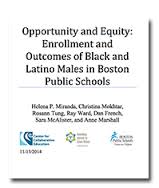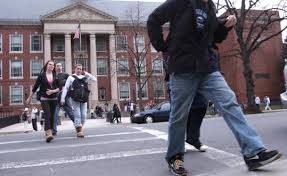 There is nothing quite like the Thanksgiving Day football game between Boston English and Boston Latin to get the Parent Imperfect thinking about the exam school choice in Boston. It is a huge choice for many individual families in the city, but it is also a choice that we, as a city, make each year about the sort of school system we want to have for our children.
There is nothing quite like the Thanksgiving Day football game between Boston English and Boston Latin to get the Parent Imperfect thinking about the exam school choice in Boston. It is a huge choice for many individual families in the city, but it is also a choice that we, as a city, make each year about the sort of school system we want to have for our children.
This year, I’ve received an unusual number of questions about the BPS exam schools, some from perfect strangers. Last Saturday was the final day for students in Grades 6 and 8 to take the Independent School Entrance Examination (ISEE) in hopes of entering one of the Boston’s exam schools for the coming year. I remember well that the parental stress level increased greatly in the days before that test. Now, at least there is a little break before the next decision point, when one must register for school and state preferences regarding the three exam schools in the system.
The calendar has generated many of the questions, but there has been another factor this year. In the midst of this year’s selecting season, BPS leadership has endorsed some eye-opening proposals to change the way students get into the exam schools.
Earlier in November, a highly publicized study of Black and Latino male achievement in the BPS confirmed what everyone in the system knows perfectly well. That the exam schools and the Advanced Work Class (AWC) programs are key elements of a system of tracking that aggravates the achievement gap in city schools. The question is what to do about the problem.
 The study, co-published by the BPS and two of the leading educational research organizations in the area, makes a number of recommendations, two of which focus on AWC and the exam schools. It recommends making all grade 4-6 programs Advanced Work programs, which is a positive way of saying that we should end the current practice of, beginning in fourth grade, taking the kids who score highest on a certain test out of their school communities and grouping them in special classrooms. If that’s not bold enough, the study went on to recommend that only children who attend the BPS for Grades 5 and 6 be eligible to apply for admission to the exam schools. This would eliminate the time-tested path to the exam schools, especially Boston Latin School, that passes through private and parochial schools. The goal would be to make the student composition of the exam schools more closely reflect the composition of the BPS, as a whole. I’ve seen proposals like this before (even made some), but at least in my memory, I’ve not seen a proposal like either of these in a document endorsed by the BPS.
The study, co-published by the BPS and two of the leading educational research organizations in the area, makes a number of recommendations, two of which focus on AWC and the exam schools. It recommends making all grade 4-6 programs Advanced Work programs, which is a positive way of saying that we should end the current practice of, beginning in fourth grade, taking the kids who score highest on a certain test out of their school communities and grouping them in special classrooms. If that’s not bold enough, the study went on to recommend that only children who attend the BPS for Grades 5 and 6 be eligible to apply for admission to the exam schools. This would eliminate the time-tested path to the exam schools, especially Boston Latin School, that passes through private and parochial schools. The goal would be to make the student composition of the exam schools more closely reflect the composition of the BPS, as a whole. I’ve seen proposals like this before (even made some), but at least in my memory, I’ve not seen a proposal like either of these in a document endorsed by the BPS.
Does this change anything for the kids who just took the test? I doubt it, at least in the short run. As in the past, families will rate the exam schools, according to their preferences, and test results will be fed, along with students’ Grade 5 and Grade 6 grades into the mysterious function machine that generates invitations to the O’Bryant, BLA and BLS.
Deciding on our order of preference among the schools felt like less of a turning point when we applied for Vince, as the word on the street was that it was pretty easy to choose BLS at first, and then change one’s mind later (not surprisingly, to change one’s preference to BLS was less simple, but that wasn’t our strategy). Now, because more and more parents apparently are making either the O’Bryant or BLA their first choice, it is more difficult to later change one’s first choice, regardless of what it is. I can find no data that says that more parents are choosing the O’Bryant and BLA first, but the cryptic placement results received by Connie suggest that it is, in fact, the case.
 In Vince’s case we later wished that we had paid more attention to the choice among exam schools. Even though it wasn’t at all clear to us that Vince’s learning style would work well at BLS (Liz will say that she was sure that it wouldn’t), we were convinced by the argument that said, “If he gets into BLS, let him try it. If it doesn’t work out, he can always switch.” Don’t be fooled by that argument. I can name you 25 kids in Vince’s senior class who have struggled mightily for 5+ years at BLS, but have resisted the idea of changing schools. Some parents of such students were clear enough or desperate enough to make the decision for their offspring, but we are among those who did not do so. In public conversation, Vince will say consistently that he really likes his school, and I have stopped doubting him on this point. He really likes the friends he has made at BLS, some of his teachers have been excellent and I expect that he likes being able to tell people that he goes to the such a revered high school. But all that love has come with considerable stress and conflict (for the whole family) and no small loss of self-esteem for the young man.
In Vince’s case we later wished that we had paid more attention to the choice among exam schools. Even though it wasn’t at all clear to us that Vince’s learning style would work well at BLS (Liz will say that she was sure that it wouldn’t), we were convinced by the argument that said, “If he gets into BLS, let him try it. If it doesn’t work out, he can always switch.” Don’t be fooled by that argument. I can name you 25 kids in Vince’s senior class who have struggled mightily for 5+ years at BLS, but have resisted the idea of changing schools. Some parents of such students were clear enough or desperate enough to make the decision for their offspring, but we are among those who did not do so. In public conversation, Vince will say consistently that he really likes his school, and I have stopped doubting him on this point. He really likes the friends he has made at BLS, some of his teachers have been excellent and I expect that he likes being able to tell people that he goes to the such a revered high school. But all that love has come with considerable stress and conflict (for the whole family) and no small loss of self-esteem for the young man.
BLS has 2400 students, give or take a few, which I believe is way too many for a school with its approach to teaching and learning. The “business model” of the school requires that the school admit well over 100 students each year that will face serious difficulties in adapting to its standards. There are more programs in place to support students in their transition (Saturday Success School, peer tutoring, etc.) than existed 10-15 years ago, but seventh graders at the school are still very much on their own to make their way in a large and unforgiving environment. There are, after all, something like 525 of them in seventh grade, so support anything like that received at many private schools is simply out of the question.
We visited both BLA and the O’Bryant with Vince and Connie. They liked things about the O’Bryant, but neither was drawn to attend the school. We never explored the reasons for that enough, but they seemed to have a mildly negative impression of the school before we even saw the place. Both liked BLA and would probably have quite happily gone there, had their parents pushed the issue, but we did not. They visited BLS after BLA and then “shadowed” a student at the school for a day. They didn’t shadow at either the O’Bryant or BLA. After shadowing, they were officially caught up in the hype and, truth be told, so were their parents. In the end, both Vince and Connie were on pins and needles in the days before their assignment arrived, anxious to hear that they were going to BLS.
 There is so, so much to say about the “hype,” and I surely can’t do it justice here. The hype is a comparative framing of the three schools and the way they sit in the whole BPS system (remember the English-Latin football game). Much of it is about the “best,” the exclusivity of exam schools and the power of the history embodied, especially, in BLS. But lurking in the definition of “best” are also powerful, often subliminal, messages about race, class and difference. I’m not accusing any school or any group within any school of projecting such messages. No one needs to project them: They are perfectly obvious, even if you aren’t looking for them, and they are powerfully reinforced by messages we all receive daily.
There is so, so much to say about the “hype,” and I surely can’t do it justice here. The hype is a comparative framing of the three schools and the way they sit in the whole BPS system (remember the English-Latin football game). Much of it is about the “best,” the exclusivity of exam schools and the power of the history embodied, especially, in BLS. But lurking in the definition of “best” are also powerful, often subliminal, messages about race, class and difference. I’m not accusing any school or any group within any school of projecting such messages. No one needs to project them: They are perfectly obvious, even if you aren’t looking for them, and they are powerfully reinforced by messages we all receive daily.
The hype and all of the changes going on for these kids (and their parents) at this time of their lives creates an emotional stew around the exam school decision that is even more toxic than the one surrounding Advanced Work Class. As parents who are busy doing too many things already, it is very easy to not deal with the complexity of this decision, let “the flow” carry one to a decision, and then, two years later, be wondering what happened.
 What does it mean to “deal with the complexity” of this decision? The two-sentence descriptions of each of the exam schools are, by now, well known. Visiting each school usually provides enough information and direct experience to begin to challenge the stereotypes. People (especially mothers) discuss the topic obsessively among friends. And, of course, we try to talk with our children about what they want for themselves.
What does it mean to “deal with the complexity” of this decision? The two-sentence descriptions of each of the exam schools are, by now, well known. Visiting each school usually provides enough information and direct experience to begin to challenge the stereotypes. People (especially mothers) discuss the topic obsessively among friends. And, of course, we try to talk with our children about what they want for themselves.
All of this is great and necessary. We did it all, but felt that something was missing. Maybe what was missing in our experience was any kind of a space for a broader community conversation about the choice, one in which we could get outside of our tight networks of friends and hear what others–including others who don’t have the exam school choice–feel about that choice. I remember really wishing that we could have this kind of conversation, even among parents at the Hernández, when Vince was in sixth grade. Since Connie was only at the Irving for a year, we didn’t have that kind of connection with parents there, so a different conversation would have been needed.


What a tangled web. I’ve never navigated the Boston Public School system, just a few suburban school districts in California, starting almost 12 years ago when my oldest, now in 11th grade, entered kindergarten. The particulars were certainly different for our family, but what strikes me is the same flavor of bewilderment at the choices (for those of us lucky to have them); the sad realization (at least for us) that even the best public school option might not be a good match for our son’s learning style; appreciation for some wonderful teachers over the years; and utter exasperation at the inflexibility of a system not built to accommodate individual variations in learning. My younger son is lucky to be the beneficiary of a new public charter school (http://www.designtechhighschool.org). But whether he stays through 12th grade is an open question, since he recently expressed interest in my alma mater (http://www.simons-rock.edu).
It would be amazing if we could have a broader discussion about these issues, even on a–gasp!–national level, that was free of the vitriol of those with entrenched positions and interests.
Thanks, Audrey, for your comment. Many people from outside Boston read this thing, but few enter the fray. I’m glad you found an option that worked for your son. You might have seen here that I’m not a big fan of the charter way, but I’ve also had to admit that, in a certain moment of desperation, we applied to charters for both our children. In the end, the public schools seemed like better options for both.
It’s funny. When I first read your comment, I was sure it said, “Are you sure you want to do this?” at the end. Now it doesn’t say that. I’m obviously losing what little of it I ever had.
I do want to be in conversation with others about this. Part of the problem is the isolation that we live in making these decisions. I think the vitriol often comes from the fact that we aren’t talking about these things across lines of comfort. I’d like to think that my positions come without the trenches, but I may be trying to make myself feel better.
I hear you about the charter school idea. The fact that this is a public charter school and a non-profit helps make me feel better. Although I’ll be the first to admit that the public school system in California is not exactly a paragon! And yes, it is hard when we are all heads-down, trying to live our lives, to step back and have those more thoughtful conversations.
Your son’s school looks like an interesting place, and I have come to the idea that families need to find solutions where they can. I think it’s one thing to identify a charter school as the best option for one’s child, and quite another to advocate for rapid charter expansion when it’s clear that this undermines public schools. I get bristly about that one, as do many of my friends and neighbors (on all sides of the discussion).
Yes, it’s tough to advocate for public education when public schools can be so problematic for so many families (including my own). I’ve never worked for pay in the school system, but I’ve not been around them long enough to see that there are lots of people in there, working very hard to educate kids. The schools are being asked to do the job of promoting social mobility and opportunity, when so much in society is moving in the opposite direction. You can see from this post that Boston is bending over backward to attract a certain demographic to the schools, and in so doing is limiting opportunities for others. The only answer I can see is to work to make the schools better and the school districts more responsive, even as we advocate for the state to provide adequate support to what is the human right of our children.
I am intrigued by the choices available in American public education and at the same time impressed with efforts like yours to share thoughts and comments. So first of all, thank you for sharing!
We are Americans living overseas and we are planning to move to Boston. I have found the array of choices overwhelming. That’s said, what is troubling me the most is that there is no public school to help people like us who are transiting back from overseas.
Take the exam schools for example. They ask for residency proof early November for the following Fall admission, which means it’s not possible for us to apply since we can’t engage in a rental lease to have a place vacant for 8 months, or buy a home and pay empty mortgages. Either way, it’s financially impractical and impossible.
In terms of aligning to international standards, I found the word ‘international’ used in school names is rather different. Coming from overseas, I would think the word means a multi-cultural and multi-national environment much like that of the United Nations, speaking different languages and having different cultures and values from more than a ‘handful’ of nations. And the school would probably offer international flavor of that education, e.g. international relations / government, world economics. But I think I am dead wrong on this one.
Then it’s the curriculum. My boys are educated under the IB curriculum and have been learning foreign languages since grade school. By next year end of 10th grade, my older boy will finish all the content of Economics 101 I have taken during my first year in University. On top of that, he has written more essays in the depth and length that I have only done so during my first year in University. Then for my younger son, who started 8th grade this semester, has written about propaganda used during the Cold War and physics lab reports on terminal velocity in parachuting. So now, what kind of school can my sons go to where they can be challenged further? And if they are judged purely base on ISEE test score and residency, is this a fair judgment? And with no exam school to accept them, where should they go to? And with no residency proof, no school will talk to us about curriculum. So how to choose the right school?
As a tax payer, I will continue to work and continue to pay my Federal tax as well as State tax (soon). And if I buy a property, which I plan to, I will be paying property tax. So as a citizen contributing to the annual budget, I would think I should not be any less of a tax payer than anyone else in the same city and state. But how will my tax dollar help educate my own children if no public school will talk to us now?
Yours Truly,
WFE – Wondering from the Far East
Thank you so much for your comments and questions. I am happy that you are thinking of relocating to Boston. It seems that your family will add much to our community. Many years ago, before we had children, my wife and I returned to the United States after living outside for several years, and found it to be a very challenging experience. Since it was just us adults returning, what we did was much easier than what you are trying to do.
As you have already found out, it is very difficult to get into the exam schools in tenth grade, even if you live here. I know, however, that the O’Bryant (the science and math-focused exam school) does admit a few students in 10th. Even if you decided that you wanted to try to enroll your boys in that school, you still need to figure out how to do this from afar. You have probably already seen that there is a public school in Boston (the Snowden) that has an IB program. I have always been curious about that program, but don’t know a lot about it. You might want to look into that school, as well. I really hate to say it, but most of the people I know who have returned to Boston in this way have decided eventually to try to live in one of the near suburbs, at least for a time, until they could get settled in the Boston schools. Given where your boys are in school, you would probably let them finish school in that town. I assume you are also looking into this possibility.
I must go now, but I am going to think about this more and see if I can get more information that might be helpful. Thanks, again, for reaching out.
For IB schools to become fully effective, in my humble opinion, it takes years for teachers and administrators to adapt to the teaching and assessment methods. It’s definitely a different style and it takes far more discipline from both students and teachers than the traditional method. If an IB school doesn’t offer statistics that tell us how many kids attained the IB Diploma and at what scores, we won’t be able to know it’s been effective.
Back to your topic, my point is that traditional exam based approach should not be the only assessment criteria. I understand schools need to use a common denominator to assess all students capabilities and national test scores are the easiest metrics to use. I just wish BPS would take a more well rounded approach to look at candidates, the schools where they come from and the types of exposures that the kids bring along to the school community. This would probably give the school and its student body a more well rounded experience. In the end, schools are to prepare our children in the real world that is round, not square; and we should not be cramming them with ISEE test papers 5 times in order to attain top scores just to get in the exam schools.
Right?
I honestly don’t know anything about IB programs, including the one at the Snowden, but I would like to find out more.
True, the exam schools should not just be based on an exam. For the BPS, it was a huge thing to begin to include Grade 5 & 6 grades into the equation. They claim that they just can’t handle anything more nuanced than that. A more nuanced and holistic review would probably conclude that less kids were ready for a school like BLS, but they don’t want that result. They need the numbers.
btw…I called someone who I sort of know at the BPS to ask if there is any responsiveness or flexibility at all in dealing with people coming into the system from outside the country. She told me that there is none…people coming from outside the system face the same calendar and residency requirements as someone living here already. She said that they’ve talked about it, but they fear that being responsive to the situations of outside folks would lead to demands for more flexibility in dealing with Boston people.
Love your blog! I discovered it about two years ago when researching BLS for my daughter. She is a sixie now and is doing great there, as I knew she would. I’m rereading some of your posts now because I remember you writing about your son’s struggles at BLS. My son is currently a 5th grade AWC student and I have serious concerns about him going to BLS, assuming he’s even accepted! If you had to do it all over again, would you have sent your son to BLA? Thanks very much!
And I love your comment, Sandy. Thanks. If I knew then what I know now, I would have sent Vince to BLA. He realizes what it has “cost” him to attend the school, and he still thinks it was the right decision.
Hello I a currently in the O’bryant and in 8th grade and I took the ISEE again but did not get into the other schools , did I lose my seat in the O’Bryant then ?
Thanks for your question, Steven, and congratulations for being in the O’Bryant! As far as I know, unless you tell the BPS that you are leaving the O’Bryant by formally “withdrawing,” you should have your seat there for 9th grade. If someone who reads this knows differently, please correct me.